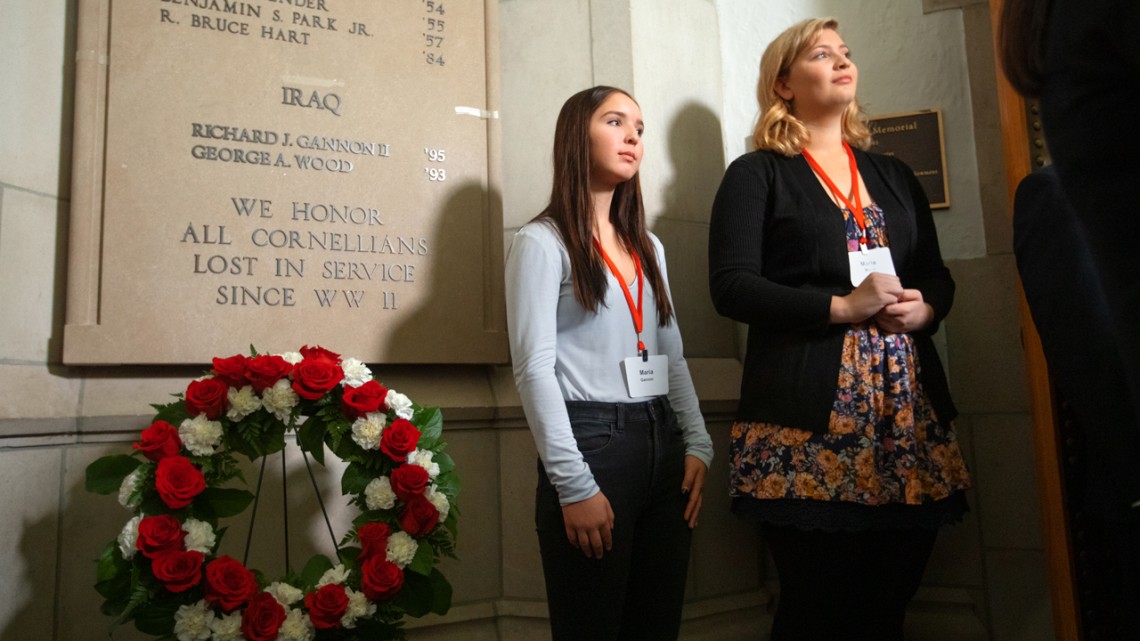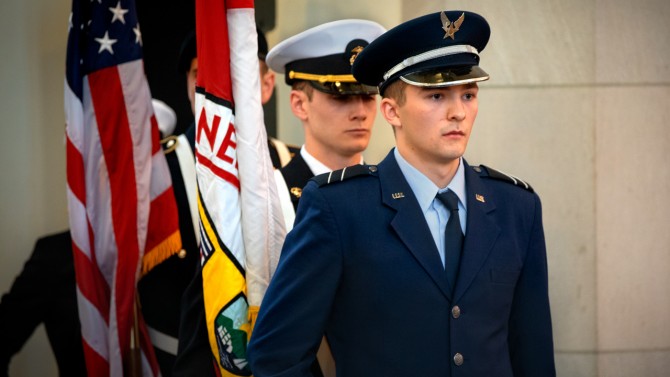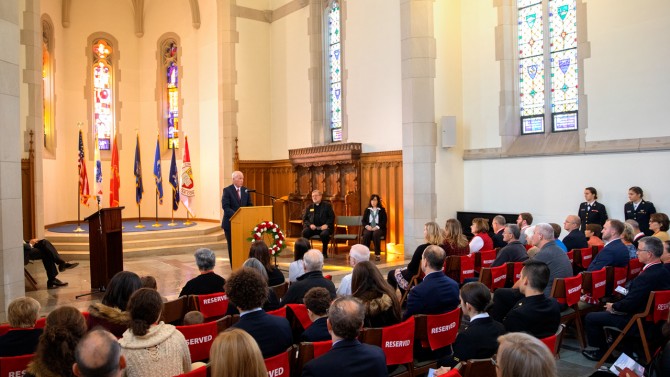
Maria Gannon, left, and Maria Wood stand beside the war memorial plaque in the Anabel Taylor Hall rotunda that honors their fathers, Maj. Richard J. Gannon II ’95 and Capt. George A. Wood ’93, two alumni killed during the conflict in Iraq.
Memorial honors fallen alumni from Iraq War
By David Nutt
Members of the Cornell community gathered at Anabel Taylor Hall on Nov. 9 to honor Maj. Richard J. Gannon II ’95 and Capt. George A. Wood ’93, two alumni killed during the conflict in Iraq.
Their names were added to the war memorial plaque in the hall’s rotunda that recognizes the 49 other Cornellians lost during the Korean and Vietnam wars and other hostile conflicts since World War II.
The ceremony was attended by family and friends of Gannon and Wood, as well as staff and student veterans and Reserve Officers’ Training Corps (ROTC) cadets.
President Martha E. Pollack said Gannon and Wood were part of a long and honored military tradition at Cornell. Civic responsibility and service are core to the Cornell ethos, she said, and over the years, tens of thousands of Cornellians have served with bravery and distinction in the U.S. armed forces.
“Major Gannon and Captain Wood came to Cornell to be part of its mission and part of its purpose, and they left Cornell with a deep commitment to its ideals,” Pollack said. “We are proud of them, of their service, and of the tradition that they upheld. They were, and they will always remain, part of the family of Cornellians, and their names and memories will always remain a part of this campus.”
Gannon attended Cornell on a Navy scholarship and majored in government and history in the College of Arts and Sciences. At Cornell, he was a member of the Marine Option Naval ROTC, and he graduated in three years. He served two tours in Iraq, during which he participated in the capture of Baghdad. As the leader of Lima Company, he worked to build area schools, improve city infrastructure and help train the police force.
On April 17, 2004, he was killed in Al Anbar Province while maneuvering through enemy fire to provide aid to wounded Marines. Gannon was posthumously awarded the Bronze Star Medal, Silver Star, Purple Heart and Meritorious Service Medal.
Gannon’s daughter, Maria, was too young to know her dad, but she said she has gotten to know him through the stories his friends have shared. His widow, Sally Gannon, remembers him as an amazing husband and father, who spent a lot of time with his family traveling, playing sports, camping, exploring national parks and making homemade pizza on Friday nights.
“Thank you for remembering the sacrifice Rick made for our country,” she said. “This is an amazing tribute to honor Rick and all the fallen.”
Wood, a Utica native, was an award-winning lineman on the Big Red varsity football team. After graduating from the College of Agriculture and Life Sciences, he earned master’s degrees from the University at Albany and from SUNY Cortland, where he joined ROTC. He was killed by an improvised explosive device in Baqubah, Iraq, on Nov. 20, 2003, at age 33.
In 2006, a bill was passed to rename the Pitcher Street Post Office in Utica as the Captain George A. Wood Post Office Building.
Wood’s daughter, Maria, described her father as intelligent, friendly, compassionate and determined. She, too, has had to get to know him through the stories that others have passed down to her.
“I wish that he were here, physically present,” she said. “But he’s here in spirit. … We shouldn’t be here crying, we should be here celebrating. He’s finally here at Cornell. And he will always be here.”
Cornell remains the only Ivy League school to house all three ROTC programs, in the Army, Navy and Air Force. In addition, the university partners with the Warrior-Scholar Project to help current and former enlisted service members prepare for college, and its Veterans Summer Bridge program helps student veterans gain a supportive foundation for the rest of their academic experience at Cornell, said Provost Michael Kotlikoff.
“We recognize that, through military service, veterans have gained maturity, skills, self-discipline and experiences that prepare them both to succeed academically and to contribute to our campus community,” said Kotlikoff, who noted that his daughter serves in the U.S. Navy on active duty. “All of us benefit from the particular backgrounds and perspectives that veterans bring to campus, and we are proud to welcome them to Cornell.”
Michael S. Hall ’68, a retired major general with the U.S. Air Force who currently manages the Ithaca-Tompkins Regional Airport, began his military career at Cornell as part of the Air Force ROTC program. He said the university’s unique diversity was its greatest strength, one that served him well in his military career.
“Major Gannon and Captain Wood were empowered by Cornell University to better serve their nation,” Hall said. “Through their choice and their selfless service, they did just that. Our immortal gratitude for their sacrifice is reflected today in this memorial. While we mourn their loss, we also celebrate their achievement and commit to hold them in our eternal memory.”
Rev. Daniel T. McMullin provided the invocation and benediction. Members of the Glee Club and Chorus sang “Evening Song” and the alma mater. The ceremony concluded with a rededication of the war memorial by Pollack.
Media Contact
Get Cornell news delivered right to your inbox.
Subscribe


